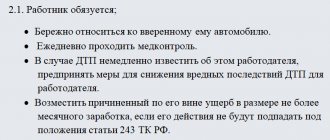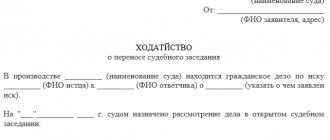The procedure for dismissal from unofficial work
The Labor Code of the Russian Federation regulates the procedure for terminating labor relations between an employee and an organization. There are two options:
- The boss, noticing that there are grounds for dismissing the employee, issues an order with which he introduces the person forced to leave his position.
- An employee of the organization submits a letter of resignation, works for two weeks if required by law, and becomes a free person, having received a work book and the money due.
But this procedure is relevant only for those cases when the relationship between the employee and the employer is formalized as it should be.
That is, an employment contract has been concluded. In the situation under consideration, everything is different.
Essentially, the employee and employer are in an informal relationship. There is no contract on paper; the employee has the work book. Salaries are paid “in an envelope”.
The parties only verbally agreed that they would cooperate. One person is to perform some labor function, the other is to pay for the work.
And if so, then the procedure for dismissal is as follows:
- The employee receives the money due to him.
- The employee goes “free swimming”.
What can you do if you fail to pay?
A lot of forums, if you search, are full of questions: “I work without a work book, I decided to leave, they haven’t paid me the money, what can I do?” Or these may be questions related to the fact that they do not pay money and are asked to wait.
You may receive a recommendation to forget about restoring justice, since the fact of employment lacks documentary evidence.
However, based on Art. 67 of the Labor Code of the Russian Federation, labor relations are recognized as formalized when the employee begins to perform labor functions with the knowledge of the head of the organization.
The answer to the question of where to go if wages are not paid without an employment contract can be answered: to the labor inspectorate and the prosecutor's office. Of course, this will require more strength and patience from you than if the employment relationship were secured by a contract. When a person worked unofficially, it is necessary to prove his actual cooperation with this employer.
By showing persistence, you can achieve a prosecutorial inspection and a labor inspector visit to the employer. Then the manager will be held accountable and obligated to pay everything due to the employee.
This is important to know: Work contract for 3 months
When it comes to massive non-payments, it makes sense to complain as a whole team by submitting a jointly drawn up statement.
How to collect evidence?
Anyone working informally needs to understand that he is obviously taking a risk by agreeing to accept such cooperation. However, it is possible to receive wages from an unscrupulous employer.
This will, of course, require witnesses who will confirm that the person worked daily at such and such an address. For proof, clients of the organization who interacted with those who were not paid their salaries can be brought in.
Documentation can be very important evidence. An employee working without an employment contract will need to painstakingly collect all available documents that bear his signature. If there is written evidence, the inspection authorities will be required to accept the complaint. The presence of a person’s signature as a representative of the organization is strong evidence of his actual work in the organization.
It would be ideal if in some documents you find how much your earnings are - in this case it will be easy to establish what the amount of unpaid funds is.
So, we can conclude: if an unemployed employee has not been paid money, then there are ways to restore justice, but it will be more difficult to collect the evidence base.
How much notice do you need to notify your employer of dismissal?
As noted, the Labor Code of the Russian Federation establishes that you need to inform your superiors about your desire to quit at least 14 days in advance. But in the situation under consideration everything is different. Formally, the employee and the employer do not have an employment relationship. Therefore, the employee can leave at any time - whenever he wants. Even, for example, in the middle of the working day. And nothing will happen to him for this.
Another thing is that the employer may refuse to pay wages. He, too, is not bound to the employee by any obligations written down on paper.
Therefore, if you leave, then immediately after receiving your salary.
Where can I go?
After receiving a claim about unpaid wages from an employee, the employer is obliged to respond to it and take action to resolve the conflict situation. However, not all managers respond to employee complaints, much less fulfill their demands. If a response has not been received or the applicant is not satisfied with it, the applicant should send a letter to the regulatory authorities.
The first authority that can help if wages are not paid without an employment contract is the labor inspectorate . There are branches in every city: you can contact a department employee directly or write an electronic complaint on the inspection website. But what if you don’t have an employment contract?
Expert opinion
Novikov Oleg Tarasovich
Legal consultant with 7 years of experience. Specializes in criminal law. Member of the Bar Association.
This means that even an unofficial employee has the opportunity to file a complaint about unpaid wages, providing government agencies with evidence of the actual performance of their duties. For example, the following can prove the fact of employment :
This is important to know: Order to recognize a fixed-term employment contract as indefinite
- Pay slips, accounting extracts, letters from the company to the employee.
- Working documents containing the employee’s details (invoices, invoices, statements).
- Response to a previously filed claim for unpaid wages.
If none of the specified papers is available, then witnesses can prove the fact of work activity: the employee can attract two people who can confirm that the employee was indeed unofficially employed.
In the same way you can contact the prosecutor's office if the labor inspectorate could not find violations on the part of the employer. By the way, this government agency is more effective, since law enforcement agencies have more powers. The application to the prosecutor's office is also submitted along with documents proving the fact of employment.
Payments due to a quitter who worked unofficially
The Labor Code of the Russian Federation establishes that an employee who quits, at a minimum, has the right to receive money for:
- actually worked time - wages;
- unused vacation - compensation.
In some cases, the dismissed employee is due other compensation and bonuses.
For example, a collective agreement may provide for payment for “loyalty to the company” if the employee, say, has worked until retirement. It's all individual. Each case must be considered separately. If there was unofficial employment, the employer may refuse to pay any funds. That’s why the advice was given above: wait for the money, then report your dismissal.
The boss may refuse to pay, saying that the person did not work for him. Therefore, there is no reason to give the “employee” money.
If an employee finds himself in a situation where he is not given money, then he needs to go to court and establish the existence of an employment relationship. This is not always easy to do. But, in general, the practice in such disputes is in favor of dismissed employees.
I worked unofficially, quit, and now my boss won’t give me my paycheck. What to do?
And then, collect the evidence that our Algorithm recommends if you have to go to court or the prosecutor’s office, the police, the tax office, or the Pension Fund.
You quit your job and your employer didn’t pay you your severance pay? Such cases have become more frequent, especially recently - see frequently published problems on this topic on our website: here, here, here, here and here, and many others.
In this algorithm, we would like to consider the most difficult option, when the employee was not officially registered and did not receive payment upon dismissal. It is in this situation that employees most often get lost and don’t know what to do, because... it turns out that they did not work in this organization, because labor relations were not formalized, as required by the Labor Code of the Russian Federation. In this case, it will be necessary to prove the very fact of work and the fact that the due payments were not received.
Evidence of the employee's work in the organization:
1. Let's start with the fact that, taking into account the requirements of Article 67 of the Labor Code of the Russian Federation, an employment contract that is not drawn up in writing is considered concluded if the employee began work with the knowledge or on behalf of the employer or his representative. It is on this basis that we need to act.
2. You can always attract witnesses, but witnesses alone may not be enough in court. Witnesses can be both your colleagues and clients with whom you contacted on behalf of the employer.
3. Proof of the existence of an employment relationship may be your telephone calls to the employer (officials), and from them to you (for example, in the form of a printout of these telephone calls).
4. Documents in which you left your signatures, or documents that you filled out completely in your own hand.
5. Announcements of vacancies for your position on the Internet, newspapers, magazines. Moreover, very often the employer in such advertisements indicates the actual wage, and not the one indicated in the staffing table, if it is divided into “white” and “black” parts. This will come in handy when the employee is trying to prove the real amount of his salary. You can take screenshots from advertisements on the Internet, and it is advisable to purchase newspapers and magazines.
6. It will also help to have a permit system at the entrance to the building where you worked, as well as the presence of video cameras. Or, for example, handing over your offices to the security console of the police, if you did this, then accordingly you transferred your data to the police, i.e. your last name.
7. Recording a conversation on a voice recorder with your immediate supervisor or other official of the employer can also be useful. Although it must be taken into account that such a recording may not be accepted in court as evidence, because its use has some subtleties. But still, sometimes judges can take it into account, especially if it is confirmed by a printout of telephone conversations.
This list can be supplemented, everything will depend on the situation and how the judicial practice on this issue develops.
Next, we bring to your attention the signs by which regulatory authorities identify organizations that pay “gray” and “black” wages. When drawing up a conversation with the employer, they will help an employee who has not received a payout upon dismissal to be more confident and convincing, especially since these signs were collected by specialists from the Federal Tax Service of the Russian Federation:
— the employment contract provides for the minimum possible salary;
— from the 2-NDFL certificate from the previous place of work it clearly follows that the employee came on less favorable financial terms;
— management salaries according to official statements are lower than the earnings of ordinary employees;
— reduction of official salaries of all employees;
— part-time employment;
— large amounts of money accountable to the organization’s employees;
— vacancy announcements indicating the amount of wages significantly exceeding the official salary;
— unmotivated “transfer” of some employees who previously worked on staff to the status of individual entrepreneurs;
- differences in the level of officially established wages and wage amounts indicated by the employer in certificates for issuing a bank loan, certificates for obtaining a visa.
Methods of proving that an employee worked for a given employer, and the signs that identify organizations paying “gray” and “black” wages, are presented in this Algorithm in case the employee still has to go to court.
The main document that is proposed in this Algorithm is a sample of writing a statement to the employer about non-payment of compensation upon dismissal. This document should help resolve this situation at the stage of negotiations with the employer in pre-trial proceedings.
Dismissal from unofficial work at the initiative of the employer
It happens that a certain company hired an employee for a position without drawing up an employment contract.
Then the person was simply kicked out. They said he was no longer needed and could look for a new job. Again, if an employment contract had been concluded, then nothing like this would have happened, because the Labor Code of the Russian Federation contains a list of grounds on which an employee can be dismissed. You can’t just kick a person out of a company.
But in a situation where the employer did not register the employee and fired him, the Labor Code does not apply.
What is called: as they came together, so they parted.
Again, the only hope is in the judicial authorities, which, if a lawsuit is filed, can recognize the existence of an employment relationship, oblige the employer to reinstate the employee, enter into an employment contract with him and pay compensation for forced absence.
Where to go for help
Expert opinion
Novikov Oleg Tarasovich
Legal consultant with 7 years of experience. Specializes in criminal law. Member of the Bar Association.
If at work they do not pay menial wages, while a person works unofficially, then you need, first of all, to complain about the very fact of the absence of an employment contract, and then about the fact of non-payment of wages.
Concluding an employment contract is the responsibility of the employer.
According to labor law, this document must be drawn up in writing and reflect all the conditions of the employment relationship.
If the contract is not drawn up in writing, it is considered concluded from the moment the employee returns to work or is allowed to perform official duties.
This norm is enshrined in Art. 67 Labor Code of the Russian Federation.
This is important to know: What to do if the employer does not give the employment contract
The employment contract must be drawn up within three days from the date the employee actually starts work. If this does not happen, the employer’s actions can be appealed to the state labor inspectorate or the prosecutor’s office.
Responsibility for the employer in case of delay in payment.
The very fact of the absence of an employment contract entails administrative liability:
In case of repeated violation, the sanctions become more severe. In addition, the appeal must indicate the fact of delayed wages, the amount of debt and provide evidence of the existence of an employment relationship and the amount of the assigned salary.
If wages are not paid for two months (in case of complete non-payment) or three months (in case of partial non-payment), it is possible to contact law enforcement agencies with a statement to initiate a criminal case.
Sometimes a surprise audit reveals multiple violations, and evidence is discovered during these audits. It could be:
- black accounting;
- availability of statements according to which actual wages were issued “in envelopes”;
- explanations from other employees and responsible persons.
Contacting regulatory and inspection authorities is a good move, but there is no need to limit yourself to them. No one is immune from carrying out a formal inspection and receiving a written statement based on its results.
The employer may also hide the offenses very carefully, and it will simply not be possible to find evidence. In this case, you should go further and contact the judicial authorities.
If the salary paid in black money is delayed or not paid at all, you should not skip the labor inspection; first of all, you need to contact the State Labor Inspectorate.
Before going to court, it is advisable to have a response from this body available. It is better to duplicate your actions to protect rights by independently collecting evidence.
Let's summarize. It is possible to punish an employer for non-payment of wages even if the employment is unofficial.
What to do if a combination of the following factors is present: lack of an employment contract and official employment, non-payment of unpaid wages:
- Submit an application to the labor inspectorate stating that you are not officially satisfied with the job, that your salary is paid “in envelopes”, and that, moreover, delays are allowed.
- If the response from the State Tax Inspectorate is unsatisfactory, file a claim in court.
- In parallel with these actions, collect evidence that labor relations exist.
The burden of proof regarding the payment of wages generally lies with the employer. If the fact of an employment relationship is established, the defendant must provide payment documents signed by the plaintiff.
Expert opinion
Novikov Oleg Tarasovich
Legal consultant with 7 years of experience. Specializes in criminal law. Member of the Bar Association.
There is no exact list of evidence on which the court will have to make a decision. The following rule applies: the more massive the evidence base, the better.
In judicial practice, decisions were made based on:
- witness statements;
- collected documents;
- audio-video recordings;
- information from open sources;
Let's take a closer look at each possibility.
If, after dismissal, an employee is not paid “black wages,” he can contact the following authorities:
- the prosecutor's office;
- tax office;
- State Labor Inspectorate;
- local police department.
“He took the money but doesn’t do anything”
Clients often demand a refund from lawyers for fees for uncompleted work. This is certainly correct: “fairness requires that the fee received by the attorney from the principal in the form of an advance for the conduct of the case should be returned to him if there was no actual conduct of the case, since the fee is assigned to the attorney for the work spent on the conduct of the case , and not for inaction, no matter whose fault it happened” (948th fragment of the Rules of the Legal Profession). But the chambers of lawyers do not have the authority to resolve property disputes (just as the Councils of Sworn Attorneys did not have them); These issues are within the exclusive competence of the court, which the chambers invariably inform the applicants about.
For the sake of objectivity, it must be pointed out that sometimes the issue of return can be resolved by the power of the authority of the legal profession. About five years ago, a disciplinary case was considered. A fairly well-known lawyer undertook to represent the defendant in an inheritance dispute. In the first instance, the lawyer argued that the statute of limitations applied, and the court rejected the claim. But for some reason he refused the limitation period on appeal, and the court granted the claim. (The question of why the court accepted the refusal to apply the limitation period and whether such a thing is possible in principle, as it goes beyond the competence of the qualification commission, remained outside the discussion. It’s a pity, the question is procedurally interesting.)
As a result, the principal lost a significant part of the property. In the complaint, he pointed out the lawyer’s improper performance of his duties and demanded the return of the fee (very impressive). The lawyer returned the fee voluntarily. True, the gravity of the offense was such that the lawyer was threatened with deprivation of his status...
Of course, if the legal community had the authority to resolve fee cases, then monetary issues would be dealt with faster, and the authority of the legal profession would increase. Nevertheless, legal practice has specifics, the nuances and subtleties of which are best understood by the lawyers themselves. But this is not yet the case, and the principals must, as before, go to court to recover unearned fees. Advokatskaya Gazeta has already talked about one such process. Here's a similar case.
Malyantovich’s arguments are, of course, quite sound and deserve respect. Interesting are Glagolev’s objections about the conduct of the case only in the first instance and about the absence of grounds for appeal (“incorrectness of the reported facts”).
Indeed, one can imagine an agreement drawn up in such a way that the lawyer accepts the conduct of the case in only one instance (as is done in criminal trials, when a separate agreement is concluded for the preliminary investigation, and a separate one for the trial). And Malyantovich’s counter-argument that if the power of attorney mentions the right to appeal, then the lawyer also has this responsibility, is not entirely convincing. The agreement is based on a contract of agency. A power of attorney consists only of an authority, but not an assignment; By accepting a power of attorney to conduct business, a contractual relationship of mandate between the attorney and the principal is not yet established. A power of attorney is a consequence of a contract of agency, an act that legitimizes the attorney, testifying to the authority of a third party. This question was well developed by I. Iosilevich (see 1st case from the article “Several legal issues”) using the example of a specific case.
But does this mean that the lawyer really has the right to enter into a separate agreement to represent the interests of the principal in the first instance, and a separate agreement in the second? The goal of the process is to achieve material truth, compliance of the decision with the rules of law and the actual circumstances of the case. The external expression of this truth is a decision that has entered into legal force. Consequently, until the decision has entered into force, the purpose of the process has not been achieved. And if an agreement is concluded only for part of the process, then it turns out, as Vladimir Ilyich said, “something formally correct, but essentially a mockery.”
Now about the “incorrectness of the transmitted facts.” We acquire knowledge of facts in two ways: either by our own observation or by the testimony of authority. Through his own observation, Glagolev could not acquire knowledge about the facts that Zakharova claimed in principle. What remains is the evidence of authority. The authority in the field of legal facts for a lawyer is, first of all, his client; The lawyer then proves the totality of these facts in court.
The “incorrectness” of a fact manifests itself in two ways: either as its absence, or as an interpretation in the opposite meaning. Interpretation of a fact in favor of one’s client is an axiom of a lawyer’s work. Therefore, an opponent's statements of fact will always be wrong to the other side's counsel, but not in themselves. The absence of a fact (its “incorrectness”) can be recognized by the one who asserted this fact. That is, in this case – Zakharova. But it is known that she herself was not present at the trial and could not refuse to state the facts. This means that Glagolev accepted on faith the interpretation of the facts by the defendant’s lawyer, which, as we know, is always the opposite of the plaintiff’s interpretation.
The fact that the facts asserted by the defendant were supported by the court does not matter to the plaintiff’s lawyer: until the decision enters into legal force, these facts remain doubtful and can be interpreted by the appellate court in the opposite sense. That is why Glagolev’s statement that he did not assume the obligation to appeal the decision is essentially incorrect: as long as it is possible to “convince the court of the correctness of your client by presenting evidence in the case, properly grouping it, indicating the relevant laws and presenting legal conclusions and considerations”, the lawyer’s duties cannot be considered fulfilled.
Having clarified the appellate duties of a lawyer, it is impossible not to mention cassation. Is a lawyer obligated to cash a decision? (We are, of course, talking about civil, not criminal, proceedings.)
A just decision consists of two components: the correct establishment of the reliability of the facts and the precise application of the law to them. The field of activity of a lawyer appealing a decision in an appeal is very wide, since almost everything can be appealed: the correctness of establishing the factual side of the case; the truth of events; the court's conclusions from the considered circumstances of the case; their proof. The situation is completely different in cassation, the exclusive subject of activity of which is only to verify the correct application of the law. Here is what the St. Petersburg Council said: “Drafting a cassation appeal seems to be an incomparably more difficult and responsible job precisely because neither the presentation of new arguments nor the presentation of new evidence is allowed in cassation proceedings, while in appellate proceedings everything that is unsaid, insufficiently clarified or what requires new evidence can be filled in later, during the proceedings in the court of appeal. Studying and understanding the factual side of the case, its essence, which represents the main task of appellate proceedings, does not require such mental effort as studying the legal side and correct formulation of cassation issues.”
But if the facts cannot be appealed, then cassation grounds are not only difficult to find, but sometimes hardly possible. Hence the rule: “If there are no reasons for cassation, then a sworn attorney should not take upon himself the preparation of one” (270th fragment of the Rules of the Profession, as well as 416th, 417th, 611th). Therefore, it is advisable to stipulate cassation proceedings in a separate agreement under the condition “if there are cassation grounds.”






